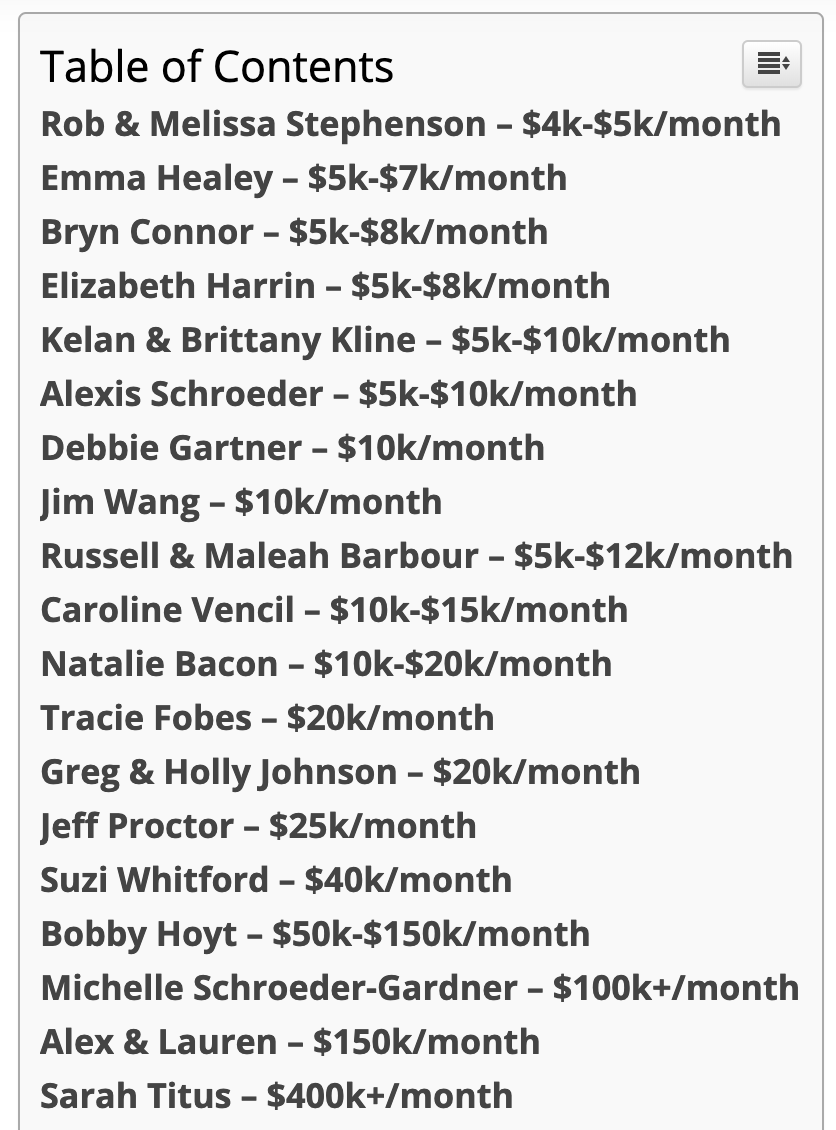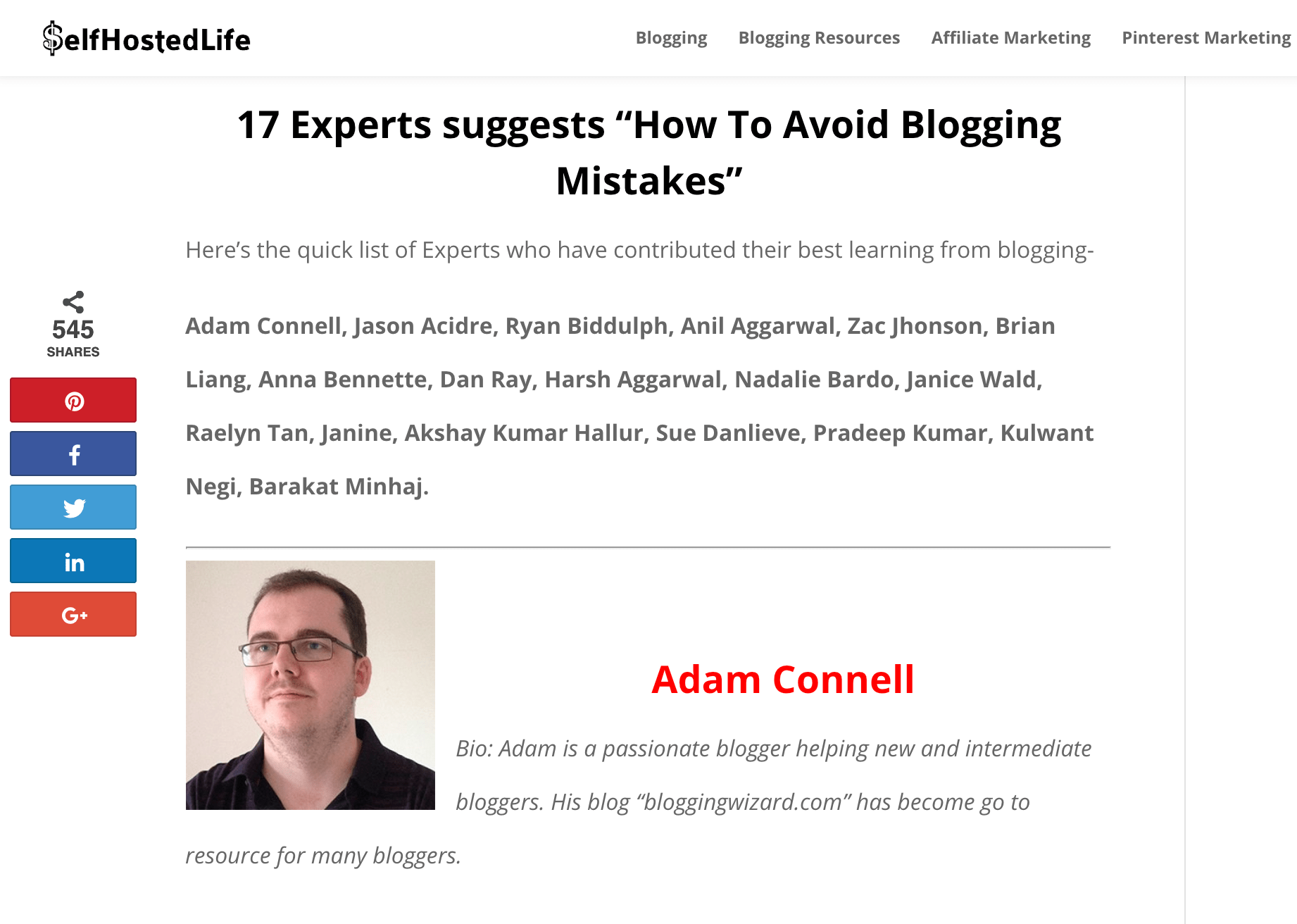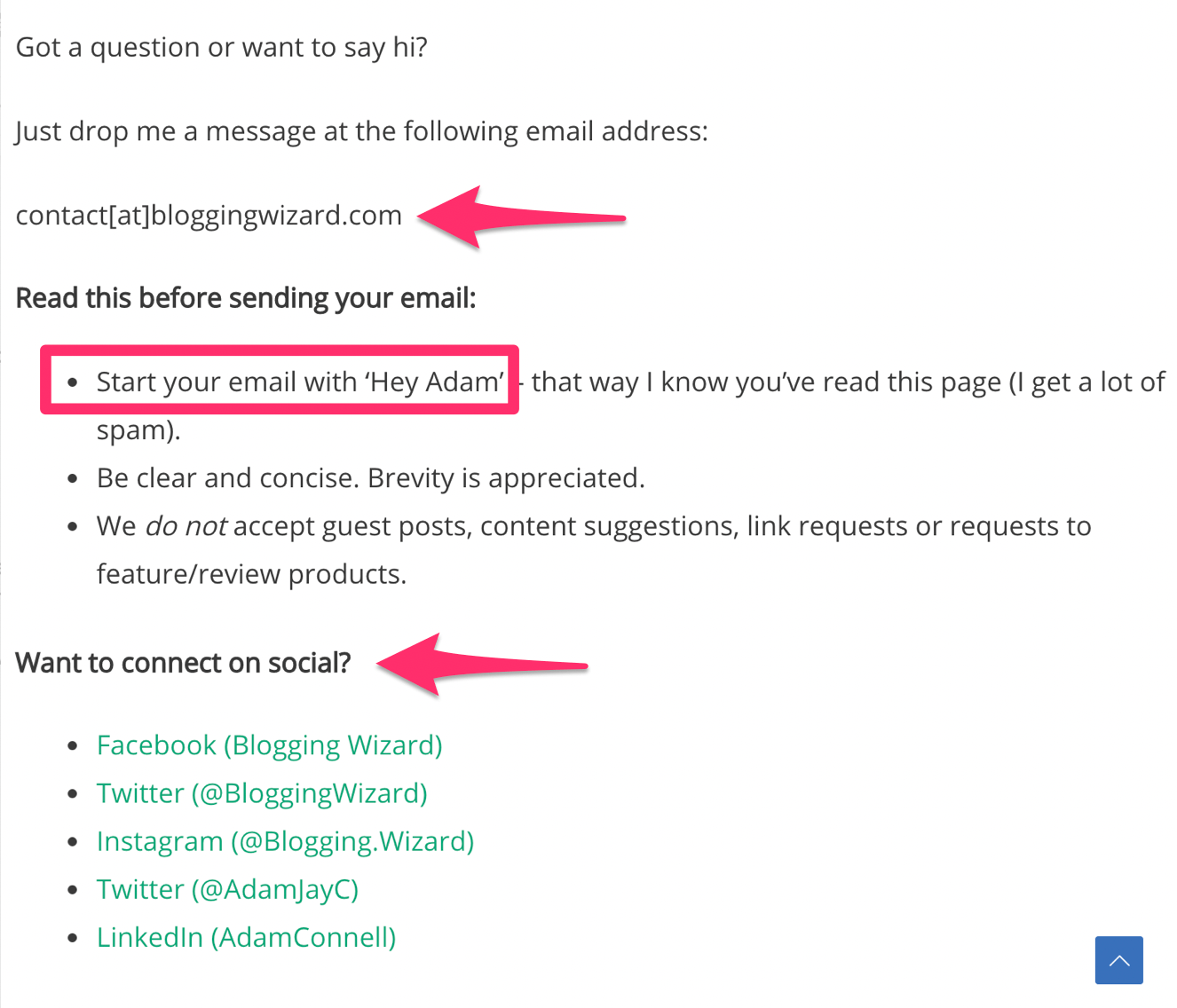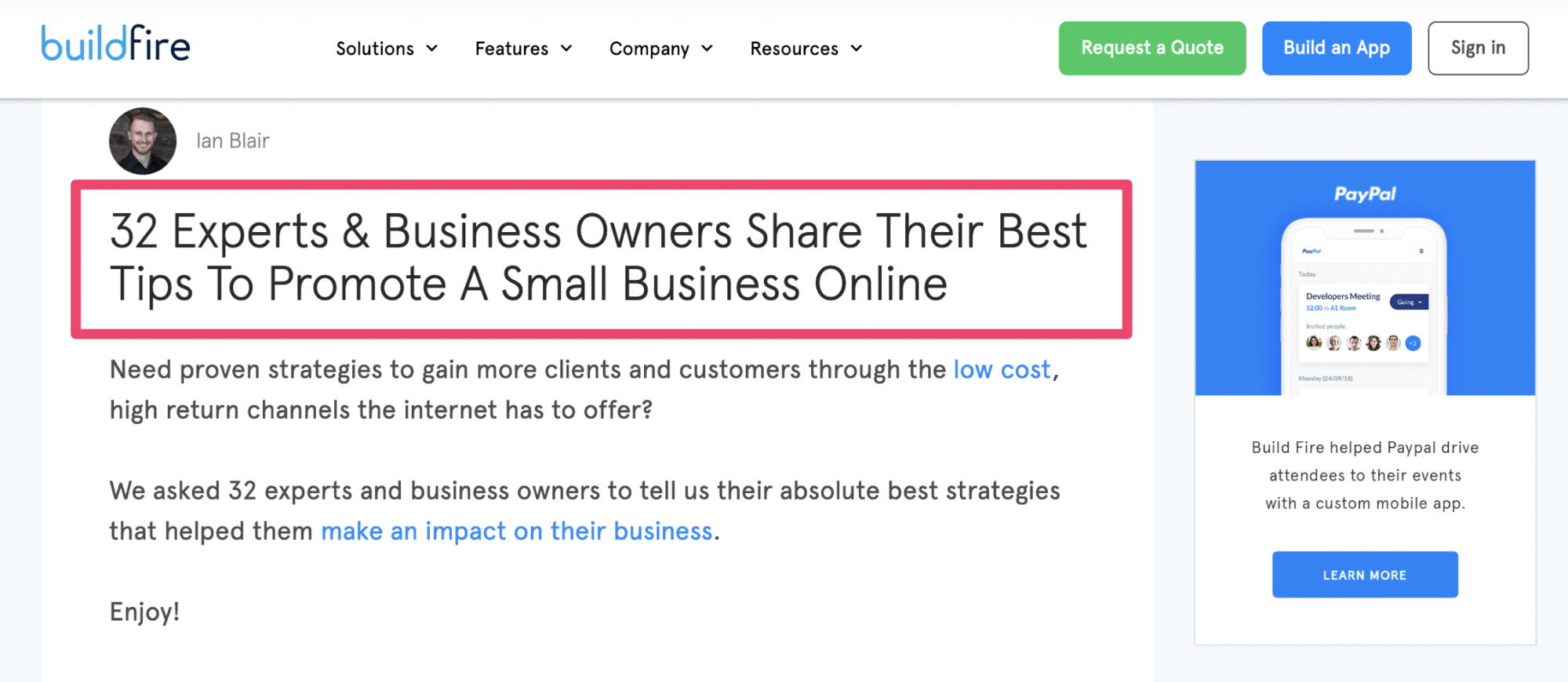How to Create an Expert Roundup Blog Post
In the past, I’ve shown you how to build links and traffic from link roundups. This strategy involves creating content that will get featured in a weekly or monthly roundup post on other websites.
Now I’m going to teach you how to create an expert roundup. What’s the difference between these two?
Rather than trying to get your link featured on another site’s roundup post, you’re going to create content on your own website using expert opinions.
At the end of the day, this will have similar advantages to getting featured on a link roundup. Creating expert roundups will still help you build backlinks, boost your website traffic, and add plenty of SEO value.
Why are expert roundup posts so great?
Here’s the thing. Not all of you have a well-known name or platform, especially if you’re just starting out as a blogger. That’s OK. We’ve all been there.
I’m not saying this to sound rude or harsh, but why should someone take your advice?
You might know what you’re talking about, but nobody knows that. If you’re an up and coming blogger, getting experts featured on your blog will give people a reason to visit your site and consume your content.
Here’s an analogy.
Let’s say you’re an avid golfer and you want to start giving people golf lessons. But if nobody knows who you are, they have no reason to listen to you, even if you’re offering excellent tips and advice.
Now let’s say you can get Tiger Woods to attend one of your golf camps. People will definitely listen to him since he’s a household name and arguably the best golfer on the planet. His presence at your golf lessons will get people to come and ultimately validate your legitimacy. You’ll get even more exposure if Tiger Woods promotes your golf lessons by telling people that he’ll be there.
You can apply this same analogy to your blog posts. Only instead of one expert, you’re going to get dozens to share their opinions.
So how do find these experts and get them to participate? I’ll explain everything you need to know in this guide.
Why expert roundup posts are so effective
Let me take a minute here to reverse the roles for a second.
Hypothetically speaking, pretend a blogger reached out to you to participate in their expert roundup. They value your opinion and want to share it on their website.
When their post gets published, you’d share it—right? Absolutely.
These posts get a ton of traffic since the experts who are part of the roundup will eventually share the content as well.
Here’s an example from the Small Business Ideas Blog.

Brian Liang wrote created this post about blog promotion, which is ironically related to the topic that we’re discussing right now.
He got 40 experts to share their marketing advice. All he did was ask them one simple question.
What can bloggers and marketers do to be more effective when promoting their content?
This is a question that so many people can relate to, and will be eager to hear the advice of experts in the industry. All different types of experts answered the question.
- SEO experts
- Affiliate marketers
- Internet marketers
- Business marketers
By getting people from different niches to participate, it increases the exposure even more.
So, how did this post perform? Check out this information from the backlink checker at Ahrefs.

It has 342 backlinks from 95 referring domains.
If you look back to the first screenshot of the blog itself, you can see that it has more than 4,000 social media shares as well.
Expert roundups generate a ton of traffic.
That’s because everyone who participates will, at the very least, throw the link up on their social media platforms. As an industry expert, they most likely have large social followings. You might even get backlinks and your link shared with their email subscribers.
Since a roundup that contains insight from a wide range of experts is such a valuable piece of content, it has a greater chance of being shared by other people as well, even if they weren’t one of the contributors. It might even end up on a link roundup.
Expert roundups validate your website and build brand awareness.
The fact that all of these experts were willing to participate and be part of something on your website shows a lot about who you are. Industry leaders won’t do this for just any average Joe.
Plus, the backlinks you’ll get from major websites will boost your domain authority.
Roundup posts help you build strong bonds and relationships with influencers. This is a great networking opportunity for you.
These experts are building links with your roundup. Whenever you introduce an expert, it’s common practice to say who they are with a link to their website. So they benefit from the exposure as well. They might even ask you to write a guest post for their website or something like that in the future.
Another top benefit of a roundup post is that it adds a new perspective to your content. You get to switch it up instead of publishing the same thing over and over again.
Find industry experts
Obviously, you can’t write an expert roundup without the help of experts.
Don’t expect these people to come to you and say, “Hey! On the off chance that you create an expert roundup, I’d love to be included in it.”
That’s unrealistic. Instead, you need to get out there and find them.
The easiest way to do this is by looking for other expert roundup posts. So use Google to your advantage.
I’ll give you an example. Let’s say you want to create a roundup about blogging mistakes. Just run a search for something along the lines of “blogging mistakes expert roundup.”
Here’s one of the top results.

19 blogging experts talk about their mistakes in this post.
There is a table of contents that includes a list of the bloggers and the amount of money that their blog generates each month.

Use this list as a resource. It’s up to you to prioritize which experts you want to contact.
You could just make a list of all of them, or go for the big ones who make $50k, $100k, or $400k per month.
Creating a spreadsheet is the best way to stay organized. The list should include:
- Name of expert
- Their website
- Contact information
- Status
In the status column, you’d put notes like, “Sent email on 5/14 — waiting for reply,” or something like that.
Don’t stop building your list of experts with just one post. Here’s another top post from that same Google search.

This similar blog shares the opinions of 17 experts.
So between these two posts alone, you’ve got 36 potential experts to reach out to. Continue adding to the list. Eventually, you’re going to narrow it down.
Don’t just take their “expert” label at face value.
You need to check out their websites, credentials, and metrics like domain authority. Look at how frequently they publish content. View their social media pages to see if they’re willing to share content from other websites.
Make sure they’re a good writer and have a strong following.
If you see someone on your list that’s an expert, but they don’t have lots of social media followers, don’t publish content frequently, and have a site with a low domain authority, you don’t need to prioritize them. You may ultimately decide not to reach out to them or include them in your roundup.
Send your pitch
Once you have your list of experts compiled, it’s just a matter of finding their contact information, which should be pretty straightforward.
Rather than just submitting a general inquiry on a website form, it’s always better to try and get their personal email address.
For example, we’ll look at Adam Connell from Blogging Wizard as an example, since he was the first expert in the post that we were just talked about. I went to his website and navigated to the contact page.

This page shows an email address.
Normally, I wouldn’t like that because it’s so general. However, since this is Adam’s website, I’m confident that he’ll receive the message.
The page also states that all email inquiries need to start with “Hey Adam” to ensure it’s not a spam message. As you can see from this page, you could also reach out to him via social media.
Your outreach messages should be very concise. For this example, you could say something like:
Hey Adam!
I’m doing an expert roundup post on my website [link to website] about blogging. Could you please answer this question for me?
“What was the biggest struggle or hurdle that you had to overcome as a blogger?”
Thanks in advance for the help. I really appreciate it! I’ll include your name, brief bio, and a link to your website in the roundup as well.
After you send the message, update your spreadsheet with notes so you can keep track of managing your communication with all of these people.
Don’t go overboard and ask them for more than they’ll be willing to deliver. As you can see from the example, all I did was ask one question. So the response can be as long or as short as he’d like it to be.
If you ask an expert to send you a 2,500-word case study, don’t expect a response.
Follow-up with emails if you haven’t heard back after a week.
Hey! I know you’re busy but I just wanted to follow up with you on this question again. Do you have a rough idea for when you’ll be able to answer? No rush. I just want to plan accordingly. Thank you!
A follow-up message like this increases the chances that they’ll participate.
Top elements of an expert roundup
Now that you’ve reached out to the top experts in your niche, it’s time to go through their responses and start writing your roundup post. If you want the post to be successful, it needs to have the following elements:
A great question
The responses given by the experts will only be as good as the question you ask them. If you ask them a yes or no question, don’t expect a high-quality response. On the flip side, if you ask for their life story, it’s going to be too long and unappealing to the readers.
Instead, look for questions that will actually add value and help people who are looking for insight. Review blog comments, forums, and Google related search suggestions to get inspiration for crafting the perfect question.
Epic headline
Don’t make your expert roundup to sound like an average “how-to” post or guide. Let everyone know that this post is different.
Here’s an example of a roundup written by Ian Blair at BuildFire.

The title is great because it’s very clear. Readers know they’re getting advice from 32 different experts. They also know exactly what the post is going to be about.
For more assistance with this, check out my guide on writing attention-grabbing headlines that convert.
Skimmable headers
Expert roundups are long. So you need to make sure the post is formatted properly so it’s easy for readers to navigate.
Let’s say your blog has 25 experts answering a question. Realistically, people aren’t going to read all 25 responses. Your headers need to be clear so that anyone can scroll through and view the answers from specific experts.
Quality images
Images are another great way to break up the content and make your blog more reader-friendly. Consider using a picture of each expert with their name and bio.
We saw this with one of our example posts earlier.
Promotion
Your work isn’t done once the roundup has been published. Now it’s time to make sure that the post performs at a high level.
For starters, you’ll want to share it on all of your distribution channels (as with all of your blog posts). But you’ll also want to make sure the experts in your post do the same thing.
Don’t expect these participants to be refreshing your website every day waiting for the post to go live. Let them know that the post has been published and send them a link. The best way to do this is with a “thank you” message.
You might also want to consider asking top experts for an exclusive interview. This type of content can be used for your YouTube channel or podcast. Plus, it strengthens your relationship with them and increases the chances that they’ll consider you for guest posting opportunities.
Conclusion
Expert roundups and link roundups are not the same things.
However, both of these strategies can help you drive traffic to your website, build backlinks, improve brand awareness, and increase your authority.
In my experience, experts are willing to participate in these roundups because they get increased exposure as well. So it’s a win-win scenario for everyone involved.
You just need to make sure that you find the right experts, ask them the right question, and promote the blog properly to ensure that it performs at the highest possible level.
So keep this guide as a reference for creating epic expert roundup blog posts on your website.
from Quick Sprout http://bit.ly/2LX8Yj0
via IFTTT
Comments
Post a Comment